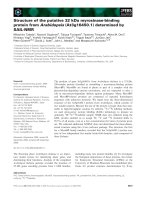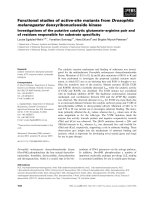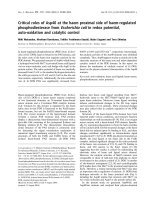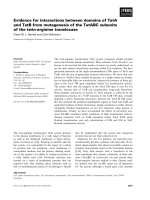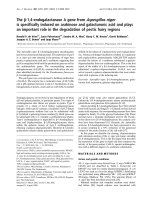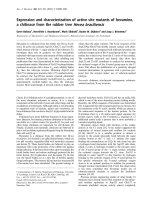Folksongs: Online business
Bạn đang xem bản rút gọn của tài liệu. Xem và tải ngay bản đầy đủ của tài liệu tại đây (965.4 KB, 6 trang )
FOLKSONGS: ONLINE BUSINESS
PHITCHAYAWEE THONGKLANG1 and RATTANA CHANTAO2
Thai department, Faculty of Humanities and Social Sciences
Khon Kaen University
Abstract
The objective of this academic article is to study about the online publication of
Thai folksong literatures from two composers, Kong Huay Rai and Chutima Sodasak, who
have publicized their works via YouTube website. This article discusses three works: Sai
Wa Si Bo Tim Kan (You Have Said Already You Won‟t Leave Me), Khu Khong (The
Soulmate); both written by Kong Huay Rai, and Poo Sao Ka Law (Party-Animal Lassie) by
Chutima Sodasak, sung by Lamyai Haitongkham. All of these have been presented to the
audience through YouTube channels.
The study, which analyzes the influence of music phenomenon to online popularity
on YouTube, reveals that until nowadays each of these three songs has earned tremendous
views on YouTube: 369 million views for Khu Khong, which is the song of a Thai TV series
Naki (Nagi, “Naga Goddess”), 13 million views for Sai Wa Si Bo Tim Kan, and 335
million views for Poo Sao Ka Law. This phenomenon corroborates that representing music
production works on YouTube becomes a cutting-edge online business strategy as it
provides artists with a decent chance to earn tremendous popularity and establish their
audience base. Therefore, YouTube can be concluded as a highly effective business tool
for showcasing music production works as a mainstream channel, gaining more positive
acceptance reflected by the increasing numbers of views and follows, and maximizing the
benefit from online business advertisement.
Keywords : Folksong, Folksong Literature, Online Business, YouTube
1
Ph.D. Student of Thai Language, Faculty of Humanities and Social Sciences, Khon Kaen
University, Thailand
Lecturer of Thai department, Faculty of Humanities and Social Sciences, Nakhon
Ratchasima Rajabhat University, Thailand
2
Lecturer of Thai department, Faculty of Humanities and Social Sciences, Khon Kaen
University, Thailand: corresponding author
947
Folksong and Online Business
Nowadays, technology plays a significant role in aiding music listeners as it both
increases their convenience and economizes their time factor. According to a survey in
2015, internet usage among Thai people has considerably increased. Considering between
the method of access; mobile devices and computers, 82.7 percent of the internet access
came from mobile devices (Public Organization, 2015), which supports the fact that
internet is an ideal source for music listening because it provides a wide range of music,
facilitates consumers‘ reach to songs, enables extra services such as music downloading, or
enables audio-visual alternatives on YouTube. The significant benefit of online music
listening is it becomes more user-friendly and offers wider range of music options through
more categories: artists, albums, genres, labels, popularity, album cover, lyrics, which
helps consumers select the right music of their choices (Possakorn Pongnetrpanich and
Kritsana Wisamitanant, 2016: 80)
Video clip is one of good online substitutes for compact disc (CD). Because of
growing popularity, music providers need to create collections of music to be provided to
consumers through applications. Raekkwan Sawasdipat and Pornthip Yenjabok (2014:12),
who wrote an academic journal about Mono Music Record Label‘s YouTube marketing
communication strategy, found that YouTube becomes the main channel for representing
the record label‘s artists and their works. Besides, the largest proportion of popularity
gained was contributed by releasing music videos (MVs) with the length of a semi-short
film and creating YouTube channels to audience with generous choices of music videos. It
also helped to publicize artists and their works and earn them greater positive responses.
This strategy, hence, has become Mono Music‘s most effective marketing selling point.
As music market grows more and more competitive, increasing more music distribution
channel therefore becomes a suitable solution. In the present, the importance and
popularity of CD fades because the advance of technology has generated various means of
substitutions such as music downloads, which promotes time economization, or pirate
cassettes, which reduces music production cost. Accordingly, in order to combat against
these threats, music providers need to establish and develop online business channels that
can benefit musical professionals, regardless of labelled or freelance. One of those means
is YouTube communication.
This academic article therefore aims to study the three folksong literatures: Khu
Khong, Sai Wa Si Bo Tim Kan, and Poo Sao Ka Law. All pieces have been publicized and
exhibited on YouTube website, which has made a phenomenal difference to Thai folksong
music by substantially growing new songsters‘ popularity measured from numbers of
views and follows from YouTube audience. Consequently, new composers can reap the
maximized benefits from showcasing their works through online business channels as they
can debut without relying excessively on record labels.
948
The Online Presentation of
Folksongs
YouTube brings about new
phenomenon to music industry because
musical composer can express their
song on YouTube. They can gain
popularity, debut through the online
platform, and enjoy a great success,
which becomes the inspiration for
modern composers. Therefore, I would
Figure 2 The View Number of Sai Wa Si Bo
Tim Kan
Source : />yiDgLAl8soc
like to discuss about two composers who
become greatly known and earn
tremendous popularity across YouTube
in this article.
Kong Huay Rai Akkaradej
Yodjumpa,
known
professionally
as Kong Huayrai or Kongla Yodjumpa,
is a singer and composer from Sakon
Nakhon province. He enjoyed a great
success from exhibiting his composition
works on YouTube because of
distinctiveness in term of vocal, lyrics and melody composition, and performance, in his
works. Distinctive vibe of modern north-eastern Thai musical style is incorporated in
Kong‘s pieces, especially Sai Wa Si Bo Tim Kan, which received a substantial popularity
from general public and won Mahanakhon Awards in 2017 (Wikipedia, 2018).
Figure 1 Kong Huay Rai
Source : />Kong + Huay Rai
Kong composed the piece from his own experience, depicting the agony of his heart
bruised by the broken promise. The lyrics, combined with Sarapanya melody, is written
with ancient Isan (north eastern Thai) dialect. Having gained abundant followers in his
own YouTube channel, he joined Sound Mee Haeng Record, the new-wave record label,
having his original work re-edited, sound re-recorded, and MV re-filmed. Currently, this
new edition gained 13 million views on YouTube, which is incomparable with the original
one. Nevertheless, Sai Wa Si Bo Tim Kan has been sung frequently in various singing
competitions (Theerapat Charoensuk, 2018).
The sensation in this masterpiece thus provided him a good opportunity to
contribute in Naki, a TV series on Channel 3, by composing songs namely Khu Khong
(The Soulmate), the original soundtrack for the show. Naki‘s popularity, belief about Naga
Figure 3 The View Number of Khu Khong 949
Source : />=wsHNUOgJJZU
(imaginary creature in Thai and Indian literatures that resembles a snake combined with
many kinds of animals), and the lyrics of Khu Khong, which is an Isan-dialect love ballad,
portraits about the steadfast love that will never fade away no matter how long the time
flies or how impregnable the obstacle is. Despite breaching the fate, the couple is still
willing to belong together at any cost or sacrifice. Khu Khong; therefore, means the
soulmates who will always wait and be there for each other forever. This song became one
of the hits in 2017, reaching 369 million views on YouTube currently. This song won
many prizes: Looktoong Mahanakhon Awards for Most Popular Song, JOOX Awards for
Folksong of the Year, and Nataraj Award for Best Drama Music. (Wikipedia, 2018).
These successes made Kong the first frontline Thai folksong artist who earned
popularity and debuted via online channel, which became a new phenomenon of Thai
folksong music. He was then invited to perform as a presenter for different product
brands, persuaded to act in movies, and hired to write original soundtracks.
Chutima Sodapak is a composer from Bueng Kan province who presented her
work on the YouTube at the age of only 17. Her career as a singer started when she began
to write the first song, Bo Kwaang Taang Eye (I‘ll Get Outta Your Way, My Sweet), and
launched it on both her personal Facebook and YouTube channel. Next, Chutima wrote
another song, A-Deet-Koey-Pung (My Ruined Past) and publicized it online. Later, a local
record label became interested in Chutima‘s work and persuaded her to join the team,
which made her one of the prolific key persons who generate a great number of
dramatically popular music works.
Chutima wrote another song Poo Sao Ka Law (Party-Animal Lassie) for a folksong
singer, Lamyai Haithongkham. The
Song depicts the lifestyle and the
characteristic of Thai provincial girls
in general with a simple and
uncomplicated language, such as the
starting verse that says, ―Hao-KaePoo-Sao-Ka-Law. Bo-Maen-Poo-SaoKa-Rian. Bo-Dai-Ka-Yun-Mun-Pian.
Pakka-Si-Kian-Young-Dye-YuemMoo.‖ This phrase means ―I'm a party
animal girl; not a nerdy one, so I am
not that studious, you know. I still
always need to borrow my friends‘
pens at every lecture.‖ This candid,
Figure 4 Chutima Sodapak
unfussy way of language usage; as a
Source : />result, effortlessly grabs the audience's
Chutima + Sodapak
attention because it can easily touch
their emotion. Having been launched on the YouTube.
The Song became highly successful and so great a sensation that the Prime Minister
needed to talk about it in his speech. Despite the absence of music video, Poo Sao Ka Law
still met an extraordinary success because of the lyrics written with a down-to-earth and
950
straightforward vocabularies depicting the actual lifestyle and social context of
northeastern Thai people in the modern days. (Theerapat Charoensuk, 2018). Chutima has
been invited to perform in many concerts. Her phenomenal success epitomizes a music
professional who makes a stellar debut on YouTube. As a conclusion, YouTube; therefore,
becomes one of innovative means for new-entry music professionals to reap the maximized
benefit from online business.
Summary
Both Kong Huay Rai and Chutima Sodapak started their career from producing
their own music works, publicizing those pieces on YouTube, and gaining popularity from
a small group of audience. Eventually,
they became highly successful.
Nowadays, Sai Wa Si Bo Tim Kan, the
song about a provincial man with a
broken heart, has received 13 million
views on YouTube. Moreover, because
of the popularity of the TV soap opera
Naki, its original soundtrack Khu
Khong (The Soulmate) has earned
many prizes, especially Nataraj Awards
for Best Drama Music, and thus 368
million views on YouTube at present.
Figure 5 The View Number of Poo Sao Ka Law
Additionally, Poo Sao Ka Law (PartySource : />Animal Lassie), the song that talks
=xir5VPhlJ_M
about Northeastern Thai society and
lifestyle, sung by Lamyai Haitongkham, has become so big
a Talk-of-the-Town that it now has been earning 335 views on YouTube. The success of
these three songs on YouTube has implanted new-wave music professionals with the
motivation to debut without relying on any big record labels. They can simply produce
their own music works from home and just launch them straightaway on YouTube.
Online music business has dramatically grown, which thus enables music producers
to showcase their creations or brainchildren online and allows music listeners to enjoy the
wider range of music choices. It is a convenient choice for artists, composers, and singers,
to produce and exhibit their works at any point of time. Accordingly, to act in line with the
advent of Thailand 4.0, which Thai economy will be mainly engineered by both
technological development, knowledge base, and creativity, it needs to be ensured that all
parties involved in music industry be supported continually and able to survive genuinely.
Therefore, the productions of songs and music, which combines both scientific technology
and artistic creativity together, need to be decently fostered and consistently developed in
order to propel Thailand‘s knowledge-based economy forward.
951
Reference
1. The View Number of Khu Khong ( The Soulmate). (2018). Retrieved March 20,
2018, from
2. />3. The View Number of Poo Sao Ka Law ( Party-Animal Lassie). (2018).
Retrieved March 20,
4. 2018, from />5. The View Number of Sai Wa Si Bo Tim Kan (You Have Said Already You
Won‘t Leave Me).
6. (2018). Retrieved March 20, 2018, from
7. />8. Chutima Sodapak. (2018). Retrieved March 22, 2018, from
9. search?q=Chutima + Sodapak
10. Electronic Transactions Development Agency (Public Organization). (2015).
Thailand Internet
11. User Profile 2015. Retrieved March 21, 2018, from
12. />13. Kong Huay - Rai. (2018). Retrieved March 22, 2018, from
14. Kong Huay + Rai
15. Photsakorn Pongnatpanich and Krisana Visamitanan. (2016). Factors Affecting
Purchase
16. Intention on Online Music Streaming Service of Smartphone Users in Thailand.
17. BU ACADEMIC REVIEW. 15, 2 (July – December) : 69 – 82.
18. Raegkwan
Swasdipat
and
Porntip
Yanjabok. (2014). Marketing
communication of mono
19. Music by youtube channel. Retrieved March 20, 2018, from
20. />0%B8%8
21. 4%E0%B8%A7%E0%B8%B2%E0%B8%A1.pdf
22. Teerapat Charoensook. (2018). ―YouTube Folksong: No Record Label
Needed For A
23. Country Folk to Win 100 Million Views‖ Retrieved
24. March 22, 2018, from />25. Wikipedia. (2018). Kong Huay - Rai. Retrieved March 20, 2018, from
26. />B8%87_%E
27. 0%B8%AB%E0%B9%89%E0%B8%A7%E0%B8%A2%E0%B9%84%E0%B8
%A3%E0%B9%88
952


